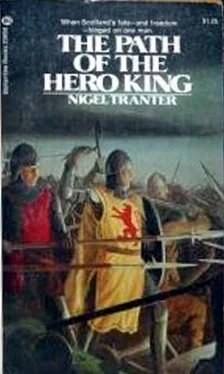That resentful man found Angus Og waiting for him at the mouth of the Firth of Clyde, and there was a great sea battle. It would be difficult to say who won-but MacDougall it was who broke off, and limped southwards, to vent his spleen on the Isle of Man for want of better target.
One more breathing-space gained-but at a price that could not continue to be paid.
Chapter Eighteen
These larks, I swear, must be traitor birds! James Douglas cried, gazing up into the pale cold blue of the early April sky, laughing.
Hear how they shout for joy. They cheer us on.
I say they are Scots larks, blown south by some storm, Gilbert Hay declared.
No English fowl could sing so sweet and true.
Sweet, perhaps. It was Thomas Randolph who took him up.
But true? Who are we to talk of Scots being true! I think the English are truer than we.
Well may you say so! Campbell accused quickly.
He means but that they breed the fewer traitors, I think, Hugh Ross said, coming to the aid of his friend. These two had grown close since that day on Loch Ness-side three years before.
You should know-both of you!
Peace, dolts! the King said, but easily, almost automatically-for this was a perennial dissension.
Every man in this host will depend on every other for his life, from here on. So who should talk of traitors? Gibbie is right. These are Scots larks, strayed a little. Like ourselves! Perhaps we should sing like them, now-lest we cannot sing hereafter!
That brought them back to reality. They had, hitherto, been almost too
carefree this sunny morning, blithe as any larks, apt to sing indeed,
in a fashion highly unsuitable for great officers of state, sheriffs
and the like. It was high time to adopt a more sober mood-though
surely not a bickering, carping one. In their lighter travelling
armour, under colourful heraldic sur coats, very fine, they sat their steaming mounts and looked back from the higher ground as the last files of their little army splashed across the ford of Esk near Kirkandrews. It was not in fact an army, but a hand-picked, tight-knit striking force of a thousand men, with a high proportion of them young knights, laird lings or the sons thereof, superbly mounted, finely accoutred and armed.
Here was indeed the cream of Southern Scotland-or such part of it as supported King Robert-selected thus for more reasons than one.
They stood, now, on the soil of England. It was five years since Bruce had last done that-and, as it happened, it was exactly here, at this remote and little-used ford that he had then crossed the Border, though then in the other direction, fleeing from Edward Longshanks fury, a day or two before he had slain the Red Comyn. Now he was back, a king himself, and with a gallant if hard-hitting company.
It was against all his normal and cherished policy, a reversal to the old more brash Robert Bruce-or so it seemed. Yet he alone had decided upon it, and of a set purpose, just as he had carefully selected the men to take with him. This, in its own way, was in fact almost as much of a play-acting and demonstration as had been his St. Andrews parliament. Morale demanded that the risk be taken-the frustrated, angry morale of his own eager young captains and leaders, the knightly class, whom he had held back from battle during all the English invasion in the autumn and turned baleful incendiary instead; and the sagging, uneasy morale of the Northern English, whose men made up the bulk of King Edwards army, still kicking its heels at Berwick after the idle winter. That army had waited for this spring for campaigning weather again, when the passes would be free of snow, the rivers cross able the bogs somewhat drier. Bruce had determined to move first, taking an enormous but calculated risk: The larks at least commended him.
They rode on through the gradually rising empty grassy moors, scarcely high enough by Scots standards to be called hills, into Cumberland. Deliberately Bruce had chosen this lonely unfrequented route. One thousand men, however disciplined, are not transported through the countryside without attracting notice, and at this stage he desired the minimum of attention.
As well as the route, he had chosen his destination with great care. It must be remote enough to receive no warning of approach, far enough into England to be significant, yet large or important enough to cause considerable heart-burning amongst the English.
There should also be secondary targets in the area. Moreover, for preference, it should belong to Robert Clifford-or some of it! He had a long score to settle with the Lord of Brougham. The valleys of the Irthing and the upper South Tyne fulfilled all these requirements in general, and the Gillsland area in particular.
By noon, the long, fast-moving column was almost twenty miles deep into England, heading east, and leaving behind the empty moors for lower ground. They had passed one or two remote villages, inevitably, as well as shepherds houses and granges; but they had left them all severely alone, and their occupants were not such as were likely to hastily send off messengers to Berwick, or even Carlisle. Crossing Bolton Fell they had had to negotiate a great drove of cattle, being herded south to Brampton market-and the drovers would assuredly tell what they had seen; but fortunately such herds moved very slowly over rough country, and by the time the drovers might give the news, it should not matter.
They came to the summit of Banks Fell, the last long rolling ridge before the Vale of Irthing, and from the shelter of scrub woodland surveyed the scene. It all looked notably fat and fertile, prosperous and peaceful, with flocks and herds grazing far and near, fresh green everywhere with patches of new tilth showing brown, many farms and granges and hamlets scattered wide, and in the centre the sizeable town of Gillsland, grey-walled and red roofed, sending its blue chimney-smoke into the clear air. A little to the east rose the warm yellow masonry, tall and fair, of Irthing Priory, amongst spreading, gardens and orchards. Yet it was in the other direction, westwards, that Bruces own glance kept turning.
Some three miles away, taller, handsomer, more splendid walls soared, amidst its own larger township-Lanercost Abbey itself.
Lanercost, where the old Edward had so long made his headquarters for the subjugation of Scotland, and from which he had set out on his last journey of hatred, to die at Solway cursing Bruce.
A-a-aye! the King breathed.
There is Lanercost, where my ruin, Scotlands ruin, was plotted. And here, he pointed closer at hand, Here is my lord Cliffords domain of Gillsland, with his priory of Irthing. Sir Robert had recently been created a Lord of Parliament.
He has burned Annandale of the Bruces four times.
And your Nithsdale twice, Thomas. I promised him a reckoning, once.
This is not it, since he is not here. But it could be a first payment!
For both of them.
The rumbling growl from those who could hear his words was a
frightening thing. There was an involuntary surge forward of urgent
horsemen. Wait you! the King commanded.
This is to be done heedfully. My way. I will have no unnecessary slaughter, no women ravished, no bairns savaged, no men hanging from trees. If any there be, others of you will hang with them, before we leave! Wallace made three mistakes. To fight at Falkirk. To trust a Halyburton.
And to fail to keep his men under good control when he raided into England. So that he created here not fear and panic and a refusal to invade Scotland again, but a burning hatred, the more set on vengeance. It is not for that we are here, see you. We have not come for vengeance either-although, God knows, I could wish we had! We are here for set purposes. To create alarm and unrest in the English camp at Berwick, so that they do not march north into Scotland. To show the rest of the North of England what is like to happen to them if they continue to provide men for the Scottish wars. And last, to gain treasure. He smiled slightly.
Читать дальше












